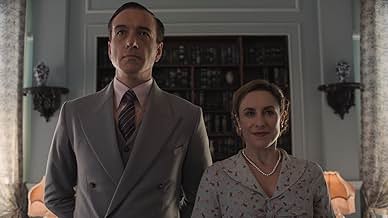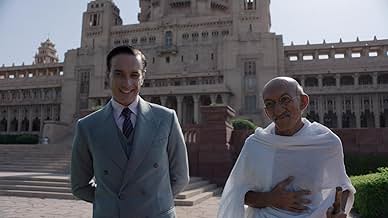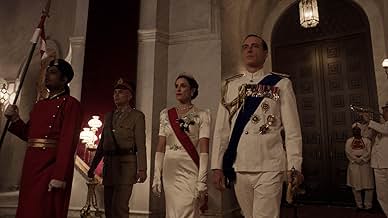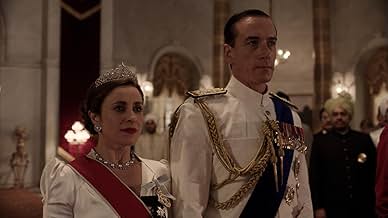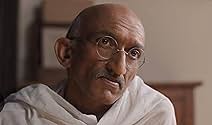Freedom at Midnight
- Série télévisée
- 2024–
NOTE IMDb
8,3/10
2,2 k
MA NOTE
Est l'histoire électrisante de la lutte de l'Inde pour son indépendance. Inspiré du best-seller du même nom, il retrace la partition de l'Inde et du Pakistan ainsi que les dynamiques religie... Tout lireEst l'histoire électrisante de la lutte de l'Inde pour son indépendance. Inspiré du best-seller du même nom, il retrace la partition de l'Inde et du Pakistan ainsi que les dynamiques religieuses.Est l'histoire électrisante de la lutte de l'Inde pour son indépendance. Inspiré du best-seller du même nom, il retrace la partition de l'Inde et du Pakistan ainsi que les dynamiques religieuses.
- Récompenses
- 10 nominations au total
Parcourir les épisodes
Avis à la une
Freedom at Midnight on Sony Liv reinvigorates the story of India's Independence and partition with fresh energy. Anchored by stellar performances-Mountbatten, Edwina, Attlee, and Jinnah-it balances historical depth with sharp, modern storytelling. Gandhi and Nehru may seem miscast initially but evolve into compelling portrayals.
Focusing on key events like the Muslim League's Direct Action Plan, Congress-Muslim League tussles, 1937 provincial elections, the series skips exhaustive timelines in favor of precision. Highlights include Gandhi's Indigo Satyagraha, where his quiet resolve awes a young Nehru, the layered tension between Jinnah and Nehru, the contrasts between Nehru and Vallabhbhai among others.
With top-tier production-authentic sets, flawless costumes, and pitch-perfect casting-the series sets a new standard for period dramas. Understated performances by Edwina Mountbatten and VP Menon leave a mark, while Louis Mountbatten brings charisma and sophistication. Tight screenplay and sharp dialogues create a thriller-like momentum moving towards partition.
Director Nikhil Advani expertly handles sensitive themes with nuance and objectivity, avoiding glorification or clichés. Freedom at Midnight is a must-watch for its balanced narrative, stunning execution, and fresh take on history.
Focusing on key events like the Muslim League's Direct Action Plan, Congress-Muslim League tussles, 1937 provincial elections, the series skips exhaustive timelines in favor of precision. Highlights include Gandhi's Indigo Satyagraha, where his quiet resolve awes a young Nehru, the layered tension between Jinnah and Nehru, the contrasts between Nehru and Vallabhbhai among others.
With top-tier production-authentic sets, flawless costumes, and pitch-perfect casting-the series sets a new standard for period dramas. Understated performances by Edwina Mountbatten and VP Menon leave a mark, while Louis Mountbatten brings charisma and sophistication. Tight screenplay and sharp dialogues create a thriller-like momentum moving towards partition.
Director Nikhil Advani expertly handles sensitive themes with nuance and objectivity, avoiding glorification or clichés. Freedom at Midnight is a must-watch for its balanced narrative, stunning execution, and fresh take on history.
"Heat not a furnace for your foe so hot that it do singe yourself."
Freedom at Midnight is a series based on Larry Collins and Dominique Lapierre's gigantic bestseller of the same name. Given the piercingly researched, strikingly visual source-material, it was always meant to be. Collins and Lapierre finished the book in 1975, just 25 years after India gained independence.
Starting in the early 1970s, the authors had unprecedented personal access to Lord Mountbatten, who was a fan of their book "Is Paris Burning?". They also accessed Jinnah's X-ray, which proved that so-called Quaid-e-Azam knew he suffered from advanced stage tuberculosis and that he wouldn't survive long - maximum a year or so!! Mountbatten told Lapierre-Collins that if he knew this, he would have delayed the decision on partition, which would have then changed the course of sub-continent's history.
Nikhil Advani, the creator of the series, says he chose to focus on events leading up to India's independence. However, Freedom at Midnight is a difficult show to make, as it is about history and politics and relies heavily on verbose conversations, meetings, debates, speeches, decisions, exposition, heavy dialogues and individual's perception.
The series features impressive performances, particularly from Chirag Vohra as Gandhi and Rajendra Chawla as Sardar Vallabhbhai Patel. Vohra delivers a physically canny rendition of Gandhi, while Chawla nails the Gujarati twang and injects Patel's shrewdness with pangs of paternal sincerity.
It's worth noting that the book "Freedom at Midnight" has been adapted into various forms, including a TV series in 1988 and a movie Gandhi with Ben Kingsley directed by Richard Attenborough. While the movie focuses primarily on Gandhi's life and role in India's struggle for independence, this TV series takes a broader approach, covering the final years of British rule in India and the events leading up to independence. This series is more of a historic epic with more emphasis on political and social upheavals of the time. It manages to capture the essence of the time period.
I have a personal connection with this book having read it during my college days. It was one of the first books (first book being The Good Earth) in English literature that I read and it left an everlasting impression on me. Even today, it gives me goosebumps to think about the horrifying incidents written by the authors, particularly the riots that started in Punjab.
After reading "Freedom at Midnight", I became a huge fan of the author duo and went on to read their other books in a marathon session. I devoured "Is Paris Burning?", "O Jerusalem", "City of Joy" and "Fall from Grace", among others. I owe a debt of gratitude to my dear friend Chetan Desai who introduced me not only to Collins and Lapierre but also to other renowned authors like Leon Uris, Somerset Maugham, Ayn Rand, Hermann Hesse and more. He also sparked my interest in English literature that has been a lifelong passion since then.
While the series may be challenging to follow at times due to its focus on politics and history, it is undoubtedly a must-watch for anyone interested in last days of British Raj and dawn of India's freedom. The ability of this series to balance individual perspectives with historical events makes it a unique and engaging viewing experience.
Overall, Freedom at Midnight is a gripping and informative series that sheds light on a pivotal moment in Indian history. I do however recommend reading the book.
Freedom at Midnight is a series based on Larry Collins and Dominique Lapierre's gigantic bestseller of the same name. Given the piercingly researched, strikingly visual source-material, it was always meant to be. Collins and Lapierre finished the book in 1975, just 25 years after India gained independence.
Starting in the early 1970s, the authors had unprecedented personal access to Lord Mountbatten, who was a fan of their book "Is Paris Burning?". They also accessed Jinnah's X-ray, which proved that so-called Quaid-e-Azam knew he suffered from advanced stage tuberculosis and that he wouldn't survive long - maximum a year or so!! Mountbatten told Lapierre-Collins that if he knew this, he would have delayed the decision on partition, which would have then changed the course of sub-continent's history.
Nikhil Advani, the creator of the series, says he chose to focus on events leading up to India's independence. However, Freedom at Midnight is a difficult show to make, as it is about history and politics and relies heavily on verbose conversations, meetings, debates, speeches, decisions, exposition, heavy dialogues and individual's perception.
The series features impressive performances, particularly from Chirag Vohra as Gandhi and Rajendra Chawla as Sardar Vallabhbhai Patel. Vohra delivers a physically canny rendition of Gandhi, while Chawla nails the Gujarati twang and injects Patel's shrewdness with pangs of paternal sincerity.
It's worth noting that the book "Freedom at Midnight" has been adapted into various forms, including a TV series in 1988 and a movie Gandhi with Ben Kingsley directed by Richard Attenborough. While the movie focuses primarily on Gandhi's life and role in India's struggle for independence, this TV series takes a broader approach, covering the final years of British rule in India and the events leading up to independence. This series is more of a historic epic with more emphasis on political and social upheavals of the time. It manages to capture the essence of the time period.
I have a personal connection with this book having read it during my college days. It was one of the first books (first book being The Good Earth) in English literature that I read and it left an everlasting impression on me. Even today, it gives me goosebumps to think about the horrifying incidents written by the authors, particularly the riots that started in Punjab.
After reading "Freedom at Midnight", I became a huge fan of the author duo and went on to read their other books in a marathon session. I devoured "Is Paris Burning?", "O Jerusalem", "City of Joy" and "Fall from Grace", among others. I owe a debt of gratitude to my dear friend Chetan Desai who introduced me not only to Collins and Lapierre but also to other renowned authors like Leon Uris, Somerset Maugham, Ayn Rand, Hermann Hesse and more. He also sparked my interest in English literature that has been a lifelong passion since then.
While the series may be challenging to follow at times due to its focus on politics and history, it is undoubtedly a must-watch for anyone interested in last days of British Raj and dawn of India's freedom. The ability of this series to balance individual perspectives with historical events makes it a unique and engaging viewing experience.
Overall, Freedom at Midnight is a gripping and informative series that sheds light on a pivotal moment in Indian history. I do however recommend reading the book.
The Freedom at Midnight series on SonyLIV is one of the best historical dramas I've watched to date. Its gripping portrayal of India's independence and the Partition is both emotionally resonant and historically rich. Directed by Nikkhil Advani, the series features brilliant performances by the cast, who breathe life into iconic figures like Gandhi, Nehru, Jinnah, and Mountbatten.
The storytelling is immersive, enhanced by authentic set designs and a hauntingly powerful soundtrack. While the pace is slow in the initial episodes, it builds up to an emotionally charged climax. The depiction of communal tensions and political negotiations is both vivid and thought-provoking.
The actors' nuanced portrayals and the show's attention to detail make it a standout. It's a deeply impactful series that leaves a lasting impression. A must-watch for history enthusiasts!
The storytelling is immersive, enhanced by authentic set designs and a hauntingly powerful soundtrack. While the pace is slow in the initial episodes, it builds up to an emotionally charged climax. The depiction of communal tensions and political negotiations is both vivid and thought-provoking.
The actors' nuanced portrayals and the show's attention to detail make it a standout. It's a deeply impactful series that leaves a lasting impression. A must-watch for history enthusiasts!
"Freedom at Midnight" deserves a solid 10/10 for its compelling portrayal of the events surrounding India's independence and partition. The documentary takes an unflinchingly honest approach, covering sensitive topics like the Bengal massacres, showing the horrors faced by hindus by communal violence. It manages to present these events without leaning into any biased narrative, allowing the raw reality of the partition's aftermath to speak for itself.
The creators have done exceptional work in balancing perspectives from all sides, bringing a level of depth and integrity to the narrative. The archival footage, firsthand accounts, and detailed explorations of the political tensions between the British, Hindus, and Muslims make the film not only historically accurate but deeply engaging. It brings to light the complexities of freedom and the tragic consequences of division, leaving viewers with a better understanding of a crucial period in history.
This documentary is a must-watch for anyone interested in unbiased historical documentaries. It goes beyond just recounting facts; it brings history to life, allowing us to reflect on the price of freedom.
The creators have done exceptional work in balancing perspectives from all sides, bringing a level of depth and integrity to the narrative. The archival footage, firsthand accounts, and detailed explorations of the political tensions between the British, Hindus, and Muslims make the film not only historically accurate but deeply engaging. It brings to light the complexities of freedom and the tragic consequences of division, leaving viewers with a better understanding of a crucial period in history.
This documentary is a must-watch for anyone interested in unbiased historical documentaries. It goes beyond just recounting facts; it brings history to life, allowing us to reflect on the price of freedom.
I was waiting for this series release since I saw the trailer. The trailer was enough to create an excitement for the series. The series intro is a masterpiece in its self, the music creates an different environment, it feels patriotic. Over all performance of the actors was remarkable, among them I loved the performance of 'Arif Zakaria' as Mohammad Ail jinnah. He played the role very wisely and precisely which I loved the most. About the story, I loved the story telling is so good. There is so much in the series which tells about the separation history of India. There is so much English used in the series which makes it little difficult to understand for normal audience, but there are subtitles available to understand. The series also does what it says in its tagline, "The history you may not know, The history you should know". And at the last but not the list, the director 'Nikhil Advani' did a great direction overall the series. I would like to thank the team of 'Freedom at Midnight' to give such a treat to us by showing us the history that we all should know as being an Indian.
Le saviez-vous
- AnecdotesAdapted from the book of the same name, authored by Dominique Lapierre and Larry Collins.
Meilleurs choix
Connectez-vous pour évaluer et suivre la liste de favoris afin de recevoir des recommandations personnalisées
Détails
- Couleur
Contribuer à cette page
Suggérer une modification ou ajouter du contenu manquant

![Regarder Trailer [OV]](https://m.media-amazon.com/images/M/MV5BOWRlODBkMWItNzdlMC00MDhjLThmNjAtNGYyMzg0NDNlZmI3XkEyXkFqcGdeQXRyYW5zY29kZS13b3JrZmxvdw@@._V1_QL75_UX500_CR0)
